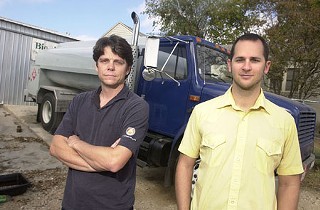Sustainable Biodiesel: Made in Austin
How two guys are putting Austin on the biodiesel map ... again
By Daniel Mottola, Fri., Nov. 28, 2008
In 2006, Austin had more biodiesel pumps than any other U.S. city, a distinction that owed much to Jeff Plowman, who co-founded Austin Biofuels in 2003 with mechanical engineer Kurt Lyell and diesel mechanic (and beer brewer) Robby Plenge. Plowman had discovered biodiesel almost by accident in 1999, while handcrafting soap for his previous business, Herbal Soapworks. Batches would sometimes go wrong, leaving a watery layer of oil that was essentially biodiesel. Plowman tried the home-brewed fuel in his diesel van – it worked, and before long, he was building Austin's biodiesel market from scratch, as Austin Biofuels. The company opened Texas' first public biodiesel pump in 2003 and by 2006 had built an estimated customer base of 200 customers, with sales of 20,000 gallons a month. The heyday, however, was short-lived.
In January, Austin Biofuels ended its direct-sales operations, and Plowman switched his focus to consulting. He cites many reasons, among them insufficient access to capital and credit, as well as what he and others in the business consider an arcane and overreaching regulatory stance toward popular biodiesel blends by the Texas Commission on Environmental Quality. Austin Biofuels isn't the only supplier closing out; the sinking price of petroleum diesel has made it less cost effective for gas stations to provide the more eco-friendly variation. The result is that today, with the exception of official city of Austin sources for fleet vehicles, biodiesel has been reduced to a solitary retail source (Eco-Wise at 110 W. Elizabeth), and it's not clear when that situation will improve. However, changes are in progress in the local industry, with the expectation that they will ready the ground for a revival.
Early this year, Austin Biofuels sold its pumps and equipment to Jason Burroughs of DieselGreen Fuels, Austin's first commercial purveyor of waste vegetable oil and Austin Biofuels' former competitor. Not long thereafter, Plowman was appointed the executive director of the Sustainable Biodiesel Alliance. And last month, Plowman and Burroughs – the two biggest players in Austin's biodiesel game – got together to make a deal. Plowman transferred ownership of a big blue tanker truck to Burroughs, and in doing so, the man who helped put Austin at the forefront of the national biodiesel market effectively handed over the keys to Austin's day-to-day biodiesel business to the next generation.
Now in the retail driver's seat, Burroughs is intent on building a profitable business using local resources to produce biodiesel for Austinites. In the meantime, as head of the SBA, Plowman will widen his focus to broader issues, such as biodiesel's impact on global food supplies and climate change. And in bringing the SBA to his hometown, he'll be once more establishing Austin as a center of innovation for the biodiesel industry.
Setting Industry Standards
Energy experts agree that biodiesel isn't going to be the silver bullet that ends our oil addiction. It's more like a silver BB in a shotgun blast of sustainability that includes several technologies. But unlike a lot of promising green innovations, biodiesel is here right now. The renewable fuel is commonly made from waste and virgin vegetable oils such as soy, canola, cottonseed, and sunflower, as well as rendered animal fat, and is chemically processed to be usable in unmodified diesel engines. Biodiesel can be blended at any ratio with petroleum diesel yet burns much cleaner than petroleum. But while biodiesel might become a partial remedy to oil dependency, critics note that biofuels exacerbate other ills – global food shortages, tropical deforestation, and climate change – by driving producers to grow fuel crops on land that was once forest or used to grow food – and then shipping it long distances. Those are problems Burroughs and Plowman each plan to address in his own way.
For Plowman, that means working with SBA. The alliance's mission is to establish biodiesel-industry standards and best practices that promote localized, low-carbon production and distribution, while directly addressing claims that biodiesel must compete with food or hasten global warming. Its goal is to establish a seal of sustainability – comparable to the U.S. Department of Agriculture "Organic" seal, says Plowman – based on a strict set of biodiesel standards. Jump-started with $100,000 from the Hard Rock Cafe, the SBA arose from a discussion among actress Daryl Hannah; Annie Nelson, the wife of biodiesel advocate and Red Headed Stranger Willie Nelson; and Kelly King, co-founder of industry pioneer Pacific Biofuel. The Hawaiian company opened the first public biodiesel pump in the U.S., turning Maui's waste vegetable oil into fuel. Sustainable biodiesel, says King, can be both green and economically beneficial to communities by keeping fuel dollars local. She said the SBA is in Austin solely because of Plowman, whose pioneering work in the field suggests that he and the city are a good fit for the organization.
In October, industry leaders gathered in Austin to begin drafting the guidelines for the SBA seal. A draft set of guidelines is posted on the group's website, www.fuelresponsibly.org, and is set to be finalized in the coming weeks. "All biodiesel is not created equal," said Plowman, "so establishing baseline practices for biodiesel production and distribution is critical to creating transparency in the marketplace and allowing consumers to know if the biodiesel they are purchasing is part of the solution or part of the problem." Fuel from small, regional production facilities using locally sourced feedstocks is preferable to fuel produced in Florida and trucked to Washington, he said, or to biodiesel made from palm oil grown on clear-cut tropical rain forest land and shipped to the U.S.
Overall, the SBA's certification system will evaluate factors such as feedstocks, water use, carbon release, working conditions, air emissions, waste handling, community benefit, and quality. Plowman cautions that using "biodiesel for biodiesel's sake could be a double-edged sword." With local and national biofuel mandates expected to grow (Austin already fuels all city-owned diesel vehicles with a 20% biodiesel blend), trucking in biodiesel from a far-flung plant simply to meet a quota may contradict the goal of sustainability. Small, local plants serving local needs are best, he said. For the customer, the sustainability seal is about making things as easy as possible. In the SBA's view, one should be able to pull into a fueling station, see the biodiesel pump labeled with a sustainability seal, and know that it was produced with a low-carbon footprint from American feedstocks. "I want biodiesel that I feel good about available to me," said Plowman.
Filling the Vacuum
The realization of the SBA's vision depends heavily on the work of start-ups like Burroughs' DieselGreen Fuels, Austin's only biodiesel retailer since the close of Austin Biofuels. He says he founded the company to help "fill a leadership vacuum in this country." Big oil companies' unwillingness to make biodiesel available to customers has given rise to similarly successful biodiesel start-ups around the country. Burroughs plans to use Plowman's big blue tanker truck to haul the large quantities of waste vegetable oil he collects for free from restaurants around town – an improvement over the trailer-mounted tanks he was using before. He'll sell some of the grease to locals who have converted their cars to run on straight vegetable oil, but most will be carted to Carl's Corner, the iconic truck stop and longtime Willie Nelson haunt outside Waco. Carl's Corner is currently undergoing a major overhaul and will reopen in the next few months as a bona fide biodiesel truck stop, both producing and selling biodiesel thanks to an on-site plant operated by Pacific Biodiesel, which is currently up and running.
Burroughs works a day job in the tech industry out of his East Austin home and has yet to take a salary from DieselGreen. He sees himself as part of an emerging new culture of green entrepreneurs: unsatisfied cube-dwellers who have devoted their spare time and money to eco-enterprises. He moved to Austin in 1996, for modest beginnings, building computers for $6 an hour. By 1999, the tech boom had treated him well – well enough to buy a fancy sports car (a Dodge Viper, "the epitome of conspicuous consumption," he calls it) on the foreboding date of Sept. 11, 2001. Soon thereafter, Burroughs found himself working in a cubicle at Dell asking, "What's next?" Like many of his peers, he was growing weary of the tech industry's "hollow pursuit" of making things ever faster and smaller. Jaded by the Iraq war and the conflict's intrinsic relationship to Mideast oil, Burroughs recognized biodiesel as a potential solution he could produce in his own garage.
DieselGreen started as a Google Group for biodiesel home-brewers, then transitioned into the nonprofit Austin Biodiesel Cooperative before Burroughs switched to a for-profit model in 2006. He now has two full-time employees, collects oil from 100 restaurants, and has set his sights on building Austin's first biodiesel plant. "It's shocking that there's not a biodiesel plant within 100 miles of Austin," he said, given that Austin currently consumes more than 500,000 gallons of biodiesel per year (New York, San Francisco, and Portland, Ore., all have plants to serve their metro needs). In two years, DieselGreen has gone from selling 1,000 gallons of fuel per month to selling about 4,000 gallons a week, with nearly $1 million in annual revenue. "My vision is to collect 50,000 gallons of waste veggie oil per month from 1,000 local restaurants" and process it into biodiesel locally, Burroughs said. He sees the use of waste vegetable oil for biodiesel as a "higher and better use" than its current applications – which, he points out, include coatings for otherwise indigestible types of cattle feed such as corn cobs and chicken feathers.
The Next Phase
For biodiesel ultimately to prosper and yet remain sustainable, producers will have to determine how to make more fuel from waste products (as in Burroughs' model), as well as from nonfood crops such as algae produced on land that's otherwise unfarmable (see "Algae: Slime to the Rescue"). Burroughs and others are also eyeing sludgelike brown grease or "trap grease," which all restaurants are required to have removed every quarter, as an untapped biodiesel feedstock. Plowman says brown grease plants are already in the works in New York and San Francisco. On the public-policy side, the industry could use a few more biodiesel lobbyists. Texas biodiesel was crippled by the way the TCEQ chose to apply its Texas Low Emission Diesel Program to biodiesel blends beginning last January, requiring expensive testing and fuel additives that producers call pointless (see "Biodiesel Industry Fumes Over State's Heavy Hand," March 14). Biodiesel receives a fraction of the incentives and giveaways granted to the petroleum industry, and a key state production tax credit was dropped this year, spooking investors.
On the national front, biodiesel did get a $1 per gallon tax credit in the federal economic bailout, a national renewable-fuel mandate calling for 500 million gallons per year of biodiesel use takes effect next year, and President-elect Obama is said to be a fan of biofuels. By 2010, automakers are expected to roll out more than a dozen new clean-diesel cars and trucks. And with aggressive entrepreneurs like Plowman and Burroughs driving the industry, Austin is likely to remain at the forefront of biodiesel progress.
For more information, see www.dieselgreenfuels.com and www.fuelresponsibly.org.
Got something to say on the subject? Send a letter to the editor.











